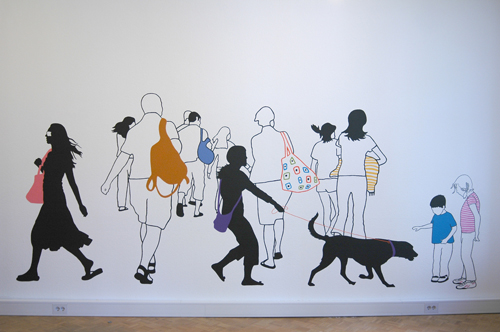Great piece from kottke.org a blog "about the liberal arts 2.0"..
I brought up a similar point in a piece I wrote last year. 
image by Andreja Brulc
Why Don't More People Live in Livable Cities?
Those lists of most liveable cities...why don't any of the vibrant big cities of the world ever make the list? Because the lists don't take into account many important reasons why people choose to live in a certain place.
I spoke to Joel Kotkin, a professor of urban development, and asked him about these surveys. "I've been to Copenhagen," (Monocle's Number 2) he tells me "and it's cute. But frankly, on the second day, I was wondering what to do." So, if the results aren't to his liking, what does he suggest? "We need to ask, what makes a city great? If your idea of a great city is restful, orderly, clean, then that's fine. You can go live in a gated community. These kinds of cities are what is called 'productive resorts'. Descartes, writing about 17th-century Amsterdam, said that a great city should be 'an inventory of the possible'. I like that description."
Joel Garreau, the US urban academic and author, agrees. "These lists are journalistic catnip. Fun to read and look at the pictures but I find the liveable cities lists intellectually on a par with People magazine's 'sexiest people' lists."
Ricky Burdett, who founded the London School of Economics' Cities Programme, says: "These surveys always come up with a list where no one would want to live. One wants to live in places which are large and complex, where you don't know everyone and you don't always know what's going to happen next. Cities are places of opportunity but also of conflict, but where you can find safety in a crowd.
"We also have to acknowledge that these cities that come top of the polls also don't have any poor people," he adds. And that, it seems to me, touches on the big issue. Richard G Wilkinson and Kate Pickett's hugely influential book The Spirit Level: Why More Equal Societies Almost Always Do Better (2009) seems to present an obvious truth -- that places where the differential in income between the wealthiest and the poorest is smallest tend to engender a sense of satisfaction and well-being. But while it may be socially desirable, that kind of comfort doesn't necessarily make for vibrancy or dynamism. If everybody is where they want to be, no one is going anywhere.
(via stellar and many emails)
Update: That Decartes quote above? He never said it.

3 comments:
Really good article there. Poor Vancouver got beat up! :D
I love Canada, but I do admit that we are a bit boring, and even some of those other livable cities, like Copenhagen and Stockholm, I agree are great, but just don't have IT...at least for my tastes.
I've lived in some of these top rated cities, Seattle in the US and Copenhagen in Europe. I think they're thinking of generic standards of living: great medical care, low crime, air quality, cultural availability, beauty of natural surroundings and quality housing. These are qualities for someone looking to settle down to raise a family or even retire. So I'll continue to live in these cities. But, since I'm single I'll continue to party in grungy Amsterdam, New York or Paris all the while living where it's calm and beautiful.
Thanks or the insight Xai Xai!
Well, Viajera, let us know when you find IT!
Post a Comment